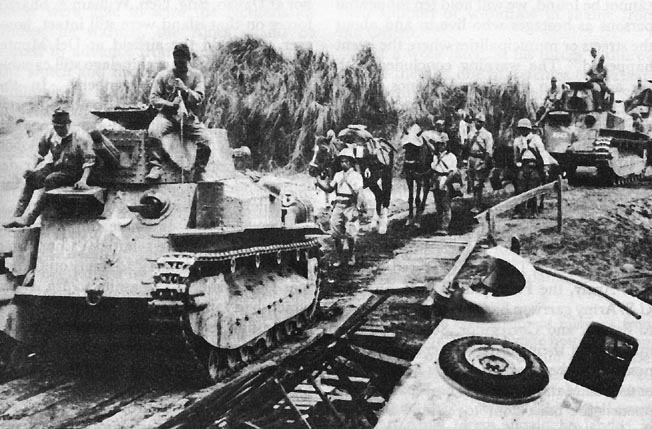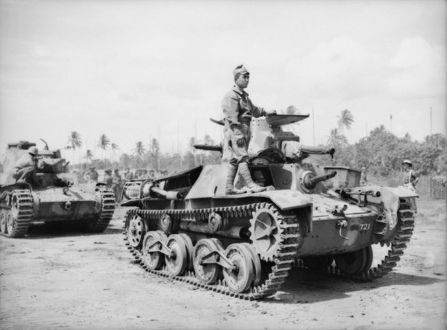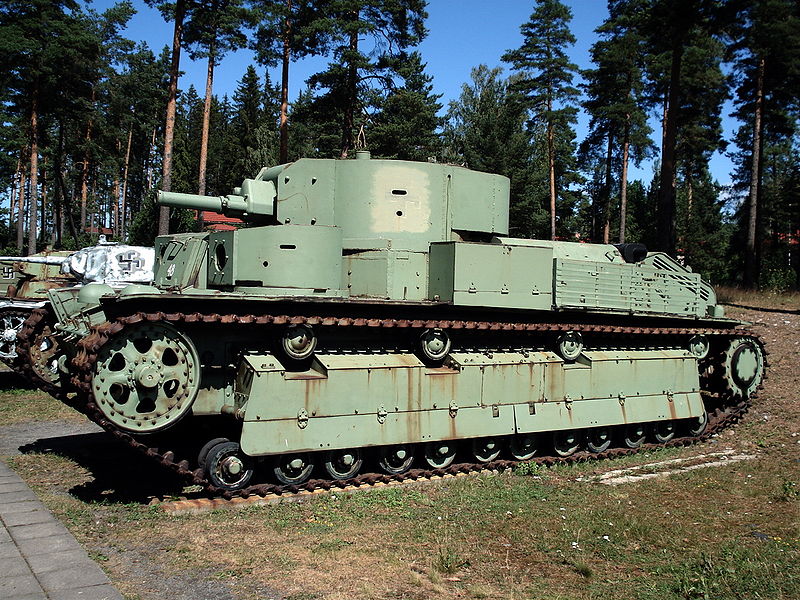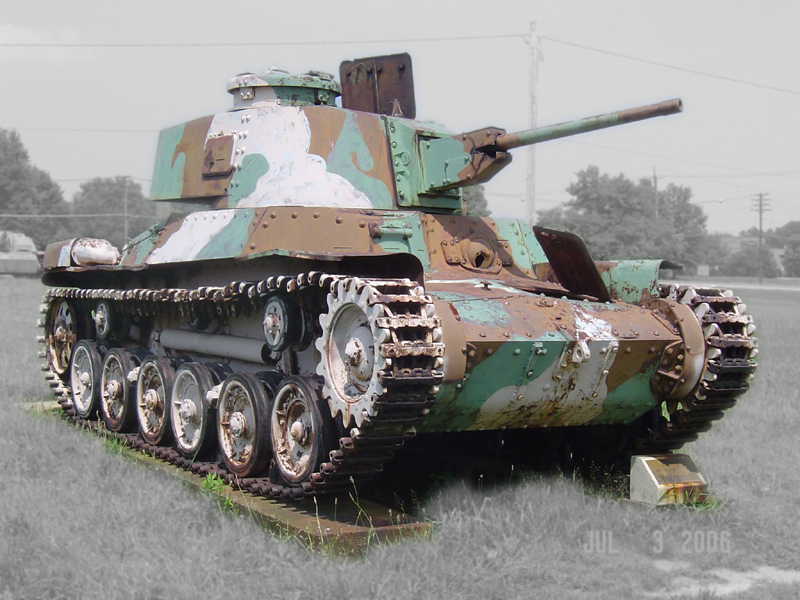Typical Japanese tanks of the 1939 era:
Type 89 Chi Ro medium tank:

Type 95 Ha Go light tank:

Posted on 08/02/2008 6:34:43 AM PDT by Homer_J_Simpson
The communiqué said the Japanese casualties totaled 400 dead and wounded. The Soviet losses were given as thirteen killed and fifty-five wounded.
[Japanese sources made no mention of large-scale hostilities on the border yesterday, but they reported that five Soviet bombers had been shot down over Korea.]
The battle began early yesterday morning, it was declared, when the Japanese forces suddenly overwhelmed Soviet frontier guards on the Changkufeng heights and advanced two and a half miles into soviet territory.
The opening onslaught was so severe, the communiqué said, that the Soviet detachment was driven from the heights, while the Japanese shelled adjacent positions to prevent the bringing up of reinforcements.
Some hours after the two-and-a-half mile advance of the Japanese, the official report said, Soviet regular forces rushed to the scene of action and drove the invaders back into Manchukuo.
[Apparently Russia and Japan both now claim possession of the Changkufeng region. The Japanese reported on Sunday that they had recaptured the zone in a “terrible fight,” and reports from Tokyo yesterday said that they were still in possession.]
It was declared that the Japanese had abandoned on Soviet soil five cannon, fourteen machine guns and 157 rifles. The Soviet equipment losses were put at one tank and one gun.
It is believed that a Soviet flier fell into Japanese hands after he had parachuted from a scouting plane.
Both before the Japanese attack and during the conflict, it was declared, Soviet troops did not once cross the Manchukuoan frontier – which deprived them of the possibility of surrounding or outflanking the invaders.
The Soviet Charge d’Affaires at Tokyo has been instructed to make an energetic protest to the Japanese Government, the communiqué said, and to direct its attention to the possibly grave consequences of operations by Japanese troops who refuse to respect the inviolability of Soviet territory, whose frontier is established by Russo-Chinese treaties and is clearly marked on maps bearing the signature of Chinese representatives.
The Soviet Foreign Office showed foreign correspondents photostatic copies of the maps in question. These place the frontier through the mountains west of Lake Khasan, to include the disputed Changkufeng heights well within Soviet territory. The maps are dated 1884. A map dated 1861, to which the Japanese have attempted to appeal, shows the boundary line several miles farther to the west.
Meanwhile, the anniversary of Germany’s declaration of war on Czarist Russia twenty-four years ago was observed in the Soviet Union today as “International Anti-War Day.”
But the danger of war is growing, and this is recognized in the press. The Red Star, the Soviet Army organ, declares that the “insolent provocation” of the Japanese “is only a single link of the chain of war preparation against the U. S. S. R., but that does not frighten us.” The newspaper asserts that “we are ready to answer blow with such crushing blow that it will sweep our enemies from the face of the earth.”
Also significant is a letter, published in the Communist Youth Pravda, from a group of Stakhanoffite workers in a Moscow lathe plant. The letter suggests that the Japanese are evidently trying to distract attention or create a diversion from their present “unsuccessful” war in China. Then, addressing the Japanese as “these foolish Samurai,” the letter continues:
“Make no mistake – the Far East is not so far as you think, and one fine day our Red pilots will remind you that it is much farther from Tokyo to Moscow than from Moscow to Tokyo. We warn you: do not stretch out your blood-stained fingers between the Soviet frontier doors lest you find your hands cut off.”
The Communist Youth Pravda is one of the best-edited papers in Russia and it is close to the Kremlin.
The Communist party newspaper Pravda stresses this statement of Joseph Stalin: “Our people must keep itself in a state of mobilized readiness to meet any attack.” That, perhaps, explains the apparent absence of excitement in official quarters and among the people. It is apparently taken for granted that the Soviet will fulfill Stalin’s pledge to “defend every inch of Soviet soil,” but most persons are inclined to doubt whether the Japanese are in a position to force the issue to the extent of a war.
Some members of the diplomatic corps take a graver view and believe that Japan has gone too far to back down. They believe that Japan may actually seek an occasion to limit her commitments in Central China or that the present Russo-Japanese incidents may “automatically” develop into an undeclared war.
Two of the Soviet planes were brought down about two and an half miles south of Kojo, two at Sozan and one near Suiryupo, the official reports said. [The Japanese reported that these planes were part of a formation of fifty, according to The Associated Press.]
It was declared that Soviet bombers in formation had attacked Korean border posts on the lower reaches of the Tumen River and bombed railway tracks near Kinsojo, south of Kojo, and a railway bridge at Keiko without causing serious damage before the five planes were shot down.
Meanwhile, it was added, other Soviet forces subjected Changkufeng, the disputed point on the Manchukuoan-Siberian border that has been responsible for the new clashes, to attacks by planes and artillery. No Japanese casualties were reported, but it was declared that the bodies of thirty-seven Russians had been found.
The developing situation caused Lieut. Gen. Seishiro Itagaki, the War Minister, to summon an urgent conference of army leaders to consider Japan’s course. The conference decided to take no action that might aggravate the seriousness of the situation, but at the same time to have Japanese forces ready to meet any emergency.
The military leaders took the view that the reported Soviet plane invasion was merely a demonstration against Changkufeng and not an offensive operation, according to Domei, the Japanese news agency.
Reports that Soviet planes had bombed Harbin in Manchukuo and Rashin and Seishin in Korea were denied by the Korean garrison headquarters, which said that the rest of the bombers had turned and fled after the five machines had been brought down.
It is authoritatively learned that the Japanese military authorities have no intention of sending war planes over Soviet territory in retaliation for the reported Soviet air raid, and that they insist that Japanese troops on the spot absolutely obey orders from Tokyo. The high command insists also, however, that positions already occupied will be retained pending diplomatic negotiations.
Although it is taken for granted that neither Tokyo nor Moscow desires actual warfare at the present moment, the situation at Changkufeng has followed much the same pattern as the incident in July, 1937, at Lukouchaio, near Peiping, which led to the present Sino-Japanese war.
The Japanese press is systematically playing down the seriousness of the situation, undoubtedly on orders, but the Japanese public is worried.
The Foreign Office spokesman says that Japan expects Russia to agree to reopen negotiations for a settlement of the border situation. He declared in an interview that Soviet troops might have mistaken recent Japanese activities along the border as a sign of weakness and a willingness to retreat and that hence they assumed an aggressive attitude. The spokesman added that Japan now took the position that, with the Japanese recapture of Changkufeng, the status quo ante territorially had been restored and must be maintained.
HSINKING, Manchukuo, Aug. 1 (AP).-In commenting on today’s raid by Soviet bombers in the disputed border region, Japanese Army officers here said that they took a serious view of the incident. They added, however, that the raid had been only a “face-saving” step on the part of the Russians.
The Japanese said the Soviet forces were seeking to counter the loss of Changkufeng Hill and other disputed positions that the Japanese reported they took yesterday. Army quarters added that except for the bombing raid the border was quiet today.
“If the Russians really meant business,” one official said, “they would have bombed the vital railway bridge near Yuki. It was untouched in today’s raid, which was concentrated on minor railway bridges, and the damage was slight.”
If major hostilities should develop on the Manchukuoan and Mongolian borders between Japan and Russia, the whole outlook of the China campaign would be changed overnight. The Soviet Government almost certainly would immediately augment China’s depleted air force. All major centers of Japanese occupation, especially Shanghai, probably would be subjected to Chinese and Russian air raids.
Foreign observers are undisguisedly dismayed at the prospect of large-scale Russo-Japanese hostilities, believing this certainly would prolong the war interminably, also aligning resurgent China irrevocably as an ally of Moscow, with a consequent rapid decline of American and British prestige and influence.
The news of the growing seriousness of Japanese-Soviet relations is causing noticeable restiveness among the Chinese population of Shanghai. Larger crowds are gathering around the bridgeheads, and extra editions of Chinese-language newspapers are selling in enormous quantities.
The situation is made more tense by exaggerated reports of the successes of Chinese guerrilla troops in the Shanghai delta area, coupled with prophecies of bombing outrages and guerrilla attacks on Aug. 13, the first anniversary of the outbreak of hostilities in Shanghai.
The authorities are already noticeably tightening precautions, fearing an outbreak of terrorism hastened by news from the Manchukuoan-Siberian borders.
SHANGHAI, Aug. 1 (AP).-Britain protested to Japanese authorities today against what was called the “increasingly belligerent attitude” of sentries guarding bridges from the International Settlement into Japanese–controlled sections of Shanghai.
The protest, delivered by Consul General Herbert Phillips, was the outgrowth of the alleged mistreatment of Miss Dorothea Lintilhac when she crossed the Garden Bridge on the wrong side of the street.
Miss Lintilhac and her mother later were arrested and detained four hours when, attempting to avoid repetition of the incident, they used the Chapoo Bridge. They said they were walking on the wrong side of the bridges because of barbed-wire entanglements and dangerous traffic.
HANKOW, China, Tuesday, Aug. 2 (AP).- United States Ambassador Nelson T. Johnson and six members of his staff left Hankow this morning for Chungking, to which the Chinese Foreign Office has moved because of the Japanese offensive directed toward the city. The Yangtze patrol flagship Luzon and the gunboat Tutuila carried the embassy staff.
F. Burke, Socialist member of the House of Assembly, suggested that the government sponsor such a race patterned after the Toronto derby, which ended in October, 1936.
A five to ten year period for the race would be suitable, Mr. Burke thought.
Legislators only laughed when a member of the United Australia party, A. Ross, asked the derby’s sponsor, “Will members of Parliament be allowed to compete?”
“Its success has not kept pace with the Japanese invasion of China nor reached the highest possible development.”
As a reason for this, the paper said:
“Some military officers, government officials and comrades of the Kuomintang have not thrown away their prejudices and are putting limitations by government order on freedom of the press and speech, arming of the masses and public assembly.”
The paper charged also that “deadly blows have not been dealt to traitors and Trotskyists.” It said that as a result the work of protecting the Wuhan cities had not progressed to the fullest extent.
The paper’s comments commemorated the third anniversary of the Communist party’s adoption of the united front and the seventeenth anniversary of its founding. In concluding, it demanded full freedom for the arming of the masses, liberty of press, speech and public meeting and called on the Chinese to make “Wuhan as impregnable as Madrid.”
I guess now we'll finally learn what's really going on in the Far East. Or not. Actually, I think this is the first article I've posted with this particular celebrity byline.
Related stories following the lead article:
SHANGHAI IS DISTURBED
about the goings on up north
BRITISH PROTEST JAPANESE STAND
Japanese rude to HM subject
Australian ‘Stork Derby’ Urged to Boost Birth Rate
OK, they are not all related to China, at least directly.
RED PAPER MAKES APPEAL
“Wuhan as impregnable as Madrid.”
Hmmm.
I believe General Zhukov was the mastermind behind the Soviet victory. He was imprisoned for being too popular after these battles, and therefore a perceived threat to Stalin. If he had been in charge in June 1941, instead of in the Gulag, the Nazis might not have had a cakewalk.
But at least he wasn’t killed in the purges, and came off the bench to win at Stalingrad etc. Something like 90% of Soviet generals were killed in the purges just prior to WW2.
Perhaps. I tend to think of these things as 'being in the right place at the right time with the right forces'.
Consider what might have happened to Patton's career had he not slapped that soldier in Sicily & been relieved? Would he have continued in command of the 5th Army at Salerno & beyond? Would his career have been spent in what became the Italian side-show after the Normandy landings? It would have been a terrible waste of America's leading armor expert. But these mistakes sometimes happen.
After the defeat at Savo Island in which the US Navy lost 2 Rear Admirals in a night cruiser battle against the Japanese, Rear Admiral Halsey was promoted to Vice Admiral & put in charge of the Solomons Campaign. He reportedly sent his 3-star VADM insignia to both widows with a note saying that he owed his current status to their husbands' brave deeds. Halsey appreciated 'luck', 'fate', or whatever you choose to call it.
This might be Zukov’s battle where he demolished the entire Japanese armored in Siberia, no survivors.
Did the Japanese have much armor up there? I was thinking that was their main problem -- that the Soviets had armor & the Japanese basically didn't?
Japan’s armor was never much, although this was considered an armored division. The Russians outgunned, out-maneuvered, out-armored, and crushed them.
If it would have been like it was in Europe, the Japanese would have not had a chance. Japan was a naval power, and weak in offensive operations far inland (unlike Nazi Germany).
Good point about fate, but it couldn’t have helped the red army that they lost 90% of their senior officers in the purges, and the rest were to terrified to tie their shoes without explicit orders.
"In 1938 Zhukov was directed to command the First Soviet Mongolian Army Group, and saw action against Japan's Kwantung Army on the border between Mongolia and the Japanese controlled state of Manchukuo in an undeclared war that lasted from 1938 to 1939.
"What began as a routine border skirmish—the Japanese testing the resolve of the Soviets to defend their territory—rapidly escalated into a full-scale war, the Japanese pushing forward with 80,000 troops, 180 tanks and 450 aircraft.
"This led to the decisive Battle of Khalkhin Gol. Zhukov requested major reinforcements and on August 15, 1939 he ordered what seemed at first to be a conventional frontal attack. However, he had held back two tank brigades, which in a daring and successful manoeuver he ordered to advance around both flanks of the battle.
"Supported by motorized artillery and infantry, the two mobile battle groups encircled the 6th Japanese army and captured their vulnerable supply areas. Within a few days the Japanese troops were defeated.
"For this operation Zhukov was awarded the title of Hero of the Soviet Union. Outside of the Soviet Union, however, this battle remained little-known as by this time World War II had begun.
"Zhukov's pioneering use of mobile armour went unheeded by the West, and in consequence the German Blitzkrieg against France in 1940 came as a great surprise. "Promoted to full general in 1940, Zhukov was briefly (January - July 1941) chief of the Red Army General Staff before a disagreement with Stalin led to him being replaced by Marshal Boris Shaposhnikov (who was in turn replaced by Aleksandr Vasilevsky in 1942).
"Ironically, this led to a relative non-accountability of Zhukov's military role in the huge territorial losses during the German 1941 invasion of the Soviet Union thus ensuring his presence "in the wings" for Stalingrad.
"The question of how much he could have done had he held command earlier is still much discussed."
Typical Japanese tanks of the 1939 era:
Type 89 Chi Ro medium tank:

Type 95 Ha Go light tank:

"The Russians outgunned, out-maneuvered, out-armored, and crushed them."
Typical Soviet 1930s era tanks:
T-26 light tank:

T-28 medium tank:

"The Type 97 Medium Tank first saw action against the Soviet Union in the Nomonhan Incident of July 1939.
"The 3rd Tank Regiment of Yasuoka Detachment had already received new Type 97 medium tanks as substitutes for existing Type 89 medium tanks, but the Regiment had replaced only four (including the regimental commander's vehicle) by time the Incident occurred. During fierce fighting against the Russians, the regimental commander's vehicle received a hit and Colonel Yoshimaru was killed.
"This was a grave warning that the Type 97 medium tank had not been designed with regard to tank fighting. However, Japan entered World War II before sufficient countermeasures were considered."

Thanks for the links. Just ‘looking’ at the competing tank designs it would appear that the main difference was in ‘how’ the armor was employed. Zhukov utilized his tanks in armored battle groups along with SP Arty & Motorized Infantry in a deep penetration battle — essentially a Blitzkrieg assault. I had read-up on the ‘incident’ during the weekend & I noted that the Russians used a lot of armored cars. This is probably how they moved their infantry.
The Japanese were more ‘conventional’ in their approach. 180 Japanese tanks. That is a divisions worth yet they were divided between only 2 tank regiments. That kinda hints at a rigid tactical system.
Even with all those seeming Russian tactical advantages, the key was the logistics employed by Zhukov. The way he utilized the limited rail capacity & augmented it with truck transport. That is why he was able to overwelm the Japanese 6th Army. Without those logistics the Russians could never have mounted an encirclement of that depth & scope.
"Zhukov utilized his tanks in armored battle groups along with SP Arty & Motorized Infantry in a deep penetration battle — essentially a Blitzkrieg assault."
Exactly.
I've argued here before, the battle of Khalkhin Gol (aka the Nomonhan Incident) of July 1939 can even be considered the war's "turning point," despite it happening before the war started.
My reasoning is that Hitler's only real possibility to win militarily was in first knocking the Soviets out of the war, before taking on the Americans.
But Hitler could only destroy the Soviets IF the Japanese kept Stalin's Far East Army tied down there.
But after Zhukov defeated the Japanese at Khalkhin Gol in 1939, most Japanese leaders lost enthusiasm for tangling with the Soviets again.
So, in their internal debates during the summer and fall of 1941, those Japanese officials who favored attacking the Soviets again (the foreign minister & army officers) were overruled and removed by those (the Navy)who favored attacking south and east.
Hense Japan decided to attack the Phillippines & Pearl Harbor, while Stalin was left free to transport his Far East divisions west for the Battle of Moscow in late 1941. After that, Hitler was doomed to eventually lose.
Well, put.
There was also the 'Natural Resources' (OIL) dimension in the debate that argued that the Dutch East Indies was the obvious direction to redress Japan's needs. In order to go there, you have to deal with American forces in the Philippines. In order to deal with US Forces in the PI you have to neutralize the US battlefleet at Pearl (Yamamoto's contribution). But this 'Southern Strategy' only really becomes apparent after Hitler overruns the Low Countries & France (1940) thereby making the French (Indochina) & East Indies (Holland) colonial holdings easy pickings.
I guess that the Japanese Army's relative lack of mechanization made them somewhat immune to the Oil-argument, insitutionally-speaking. Until mid-1940, that is.
I happened to run across the actual numbers.
"In a series of show trials, Stalin subjected nearly half of his officer corps to prosecution, relief from command, and, in many cases, death by execution.
"By 1938, some 35,000 officers out of a total corps of 80,000 had been purged, including:..."
"...With so many senior commanders liquidated, [Stalin's]fromidable force of some 5.37 million soldiers was largely leaderless and therefore vulnerable."
Every serious historian who tries to plumb the depths of President Roosevelt's mind comes away shaking his head, saying it's a complete cipher -- no way to say what FDR was really thinking.
So I'm going to rush in where angels fear to tread, and say I think Roosevelt suckered the Japanese into attacking south and east instead of north.
I also think Hitler had only himself to blame, since up until the battle of Moscow, Hitler was utterly confident he could defeat the Soviets on his own -- didn't need Japanese help.
Indeed, I doubt if Hitler even knew about Stalin's Far East Army, or the battle of Khalkhin Gol, since Stalin's counterattack at Moscow came as a complete surprise to German war planners.
The Japanese assaulted some of the East Indies oil fields by parachute. Even so, the allies (at American instigation) managed to sabotage the oil fields making them unproductive for many months. That little tidbit sort of supports your contention about Roosevelt.
Disclaimer: Opinions posted on Free Republic are those of the individual posters and do not necessarily represent the opinion of Free Republic or its management. All materials posted herein are protected by copyright law and the exemption for fair use of copyrighted works.